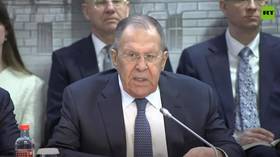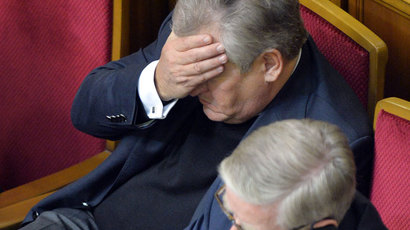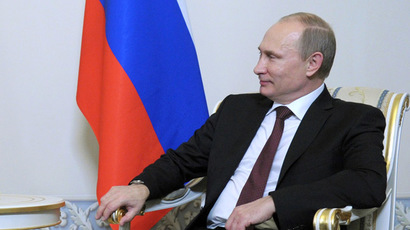‘Revolution!’ Thousands pour in for pro-EU rally in Ukraine, storm govt buildings
Thousands of pro-EU demonstrators chanting ‘Revolution!’ protested on ‘Maidan’ square in Kiev on Sunday, despite a court-imposed ban on rallies. Over 200 people – both protesters and police – were injured in the ensuing clashes.
Follow RT's LIVE UPDATES on protests in Kiev.
Chanting protesters displaced metal barriers that were installed by police on Independence Square, also known as Maidan (Ukrainian for "square"), as more were expected to flock into the capital from the regions. Ukrainian media said that some 700,000 people gathered, calling for the Ukrainian government and the president to resign over rejecting EU association earlier this week.
By late evening tensions seemed to be dying down in the country’s capital, although the situation is still tense, RT’s Aleksey Yaroshevsky reports from Kiev. He estimates that there are still up to 20,000 people protesting at the central square.
The Kiev City State Administration was occupied by protesters and vandalized with a sign saying “Revolution Headquarters.”
Штаб революции pic.twitter.com/143ivxQT9d
— Ilya Varlamov (@varlamov) December 1, 2013
The raging crowd, which split into several columns, also stormed the Mayor’s offices, breaking windows and opening the doors from the inside, Itar-Tass reported, citing local media.The protesters set up what they described as the temporary headquarters of the united opposition. The Trade Union building near ‘Maidan’ square has also been taken by the ‘provocateurs’ bearing emblems of the opposition parties. Other reports claim that the Ukrainian Cabinet of Ministers building was stormed.

Also late on Sunday, dozens of protesters attempted to deface the monument of Russian revolutionary leader Vladimir Lenin on Kiev’s Bessarabskya Square, but were repelled by the police who stopped them from succeeding. Brief clashes between the sides followed.
Teargas, stun grenades as police clash with protesters at Ukrainian Presidential HQ
Hundreds gathered at the Ukrainian Presidential Headquarters compound attempting to storm the building. Riot police arrived at the scene. As protesters tried to break through police lines, clashes broke out. Smoke surrounded the compound, amid reports of gunfire, the sounds of explosions and teargas. Live broadcasts showed that security forces were stoned and firebombed, responding with stun grenades.
City officials said that at least 165 protesters were injured in Sunday clashes, 109 of whom were hospitalized. Nearly 160 police officers have sought medical help as well.
On Sunday the administrative court in Kiev complied with a suit from the city mayor's office, prohibiting rallies on two major city squares until January 7 – including Independence Square – and three streets in downtown Kiev. That means that until Orthodox Christmas any kind of demonstration will be illegal and suppressed by law enforcement.
In the first half of the day, police opted to leave the scene of persistent demonstrations following accusations that law enforcement had used disproportionate force on Saturday while dispersing an opposition rally in downtown Kiev.
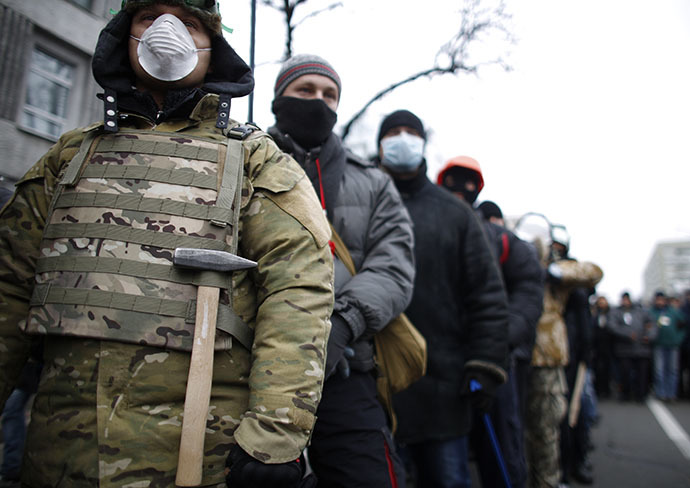
As no one had been guarding either the mayor’s office or Maidan Square, some activists from the crowd urged other demonstrators to keep order and watch out for provocateurs earlier on Sunday. On the way to Maidan, a column of protesters detained a group of provocateurs who attempted to vandalize the mayor’s office by breaking the windows. A group of young masked people dressed in black wearing orange safety helmets was surrounded by opposition activists, who tore the masks off their faces to take photos of the youths for further identification. It turned out that the group was being led by opposition journalist, Tatyana Chornovil.
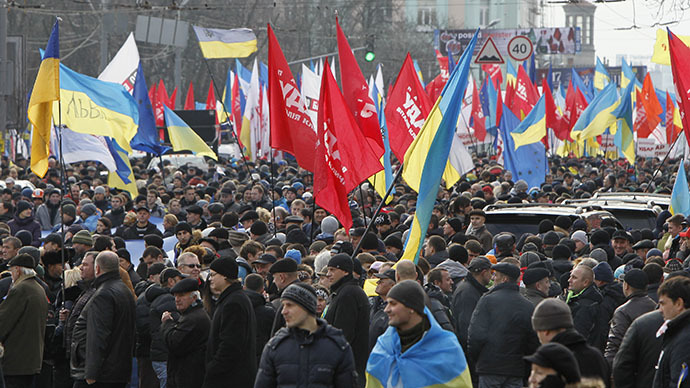
Police Chief steps down
It was announced on Sunday that the Kiev police chief, Valery Koryak, resigned following accusations that law enforcement used disproportionate force while dispersing an opposition rally in downtown Kiev.
Early on Saturday morning, about 1,000 officers of the special police task force, Berkut, dispersed protesters on Independence Square, putting an end to the rally that had been going on there for a week. Some protesters resisted violently, with 35 of them finding themselves in custody, but were released by noon the same day. Seven people were hospitalized while over 30 in total sustained injuries in Saturday’s turmoil.
The actions of the police in Kiev raised a storm of criticism from the US and the EU. Ukrainian President Viktor Yanukovich also condemned the use of force against the demonstrators and ordered the prosecutor general to investigate the situation.
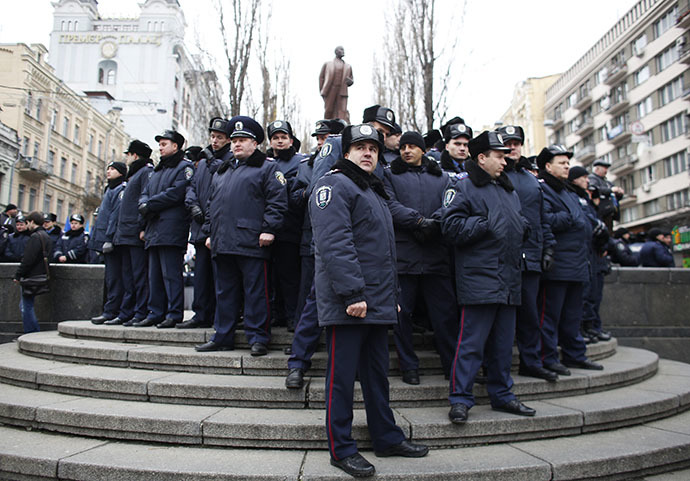
Ukraine’s Prosecutor General, Viktor Pshonka, ordered an investigation into the lawfulness of the use of impact munitions by police and also to verify whether there were provocateurs among the protesters.
“People were rallying on Maidan legally. This is their constitutional right and the task of law enforcement in the first place is to ensure realization of that right,” the prosecutor general said.
In the meantime the former police boss, Valery Koryak, said that police had to use force against aggressive protesters, which threatened the “life and health of the police officers”.
He also said that following night brawls between protesters and riot police 12 criminal cases have been opened against people who opposed the police with force and attempted to seize public buildings.
Opposition unite against President Yanukovich
The city of Kiev is a hive of activity today - thousands of cars are honking their horns as they pass through the city center, and people are getting ready for a new opposition action.
Three opposition parties united to conduct a “popular assembly” in the capital on Sunday despite the ban. The new opposition rally in Kiev kicked off at noon, immediately gathering up to 1,500 people in Mikhailovskaya Square, which has seen no restrictions for public actions.
The protesters were chanting slogans “Glory to Ukraine!” and “United we are strong!”
Up to 10,000 supporters of pro-EU integration from western parts of the country are reportedly making their way to Kiev to take part in the rally.
In the city of Lvov in western Ukraine, where pro-EU activists have always been particularly active, the authorities have announced they have no plans to stop the anti-government rally. They also announced that a general strike would take place on Monday.
The boxing champion, Vitaly Klitschko, who now heads the liberal UDAR party, addressed the Lvov rally in person, calling citizens to go to the capital in support of the opposition’s assembly against the government.
The protesters started to gather near Kiev University, next to the monument to poet Taras Shevchenko and then marched to Maidan, with tight security looking on.
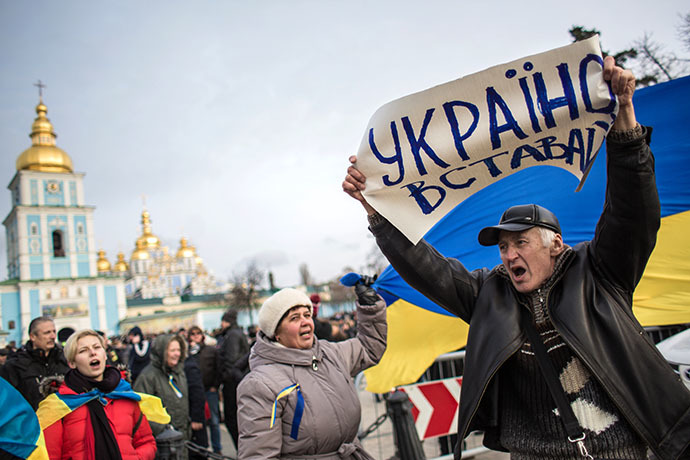
But those Kievans who live close to the country’s main protest scene are not happy at all with this disturbance of their peace. Besides that, the protest organizers haven’t arranged for a sufficient quantity of portable toilets, so residents around Independence Square have been complaining about the “obnoxious odor in the neighborhood”, as Ukrainian bloggers put it.
Authorities warn against further destabilization
Prime Minister Nikolay Azarov has warned the protesters that if they violate the law and destabilize the situation in the country that they would be held responsible.
“They must have not read the agreement (with the EU) and they rely on myths,” Azarov said, explaining why the Ukrainian government finally had to reject the EU proposal.
Politicians and leadership have to take decisions without emotion and appraise the reality correctly, Azarov said. He pointed out that protests might worsen the economic situation in the country, in particular the exchange rate of the national currency.
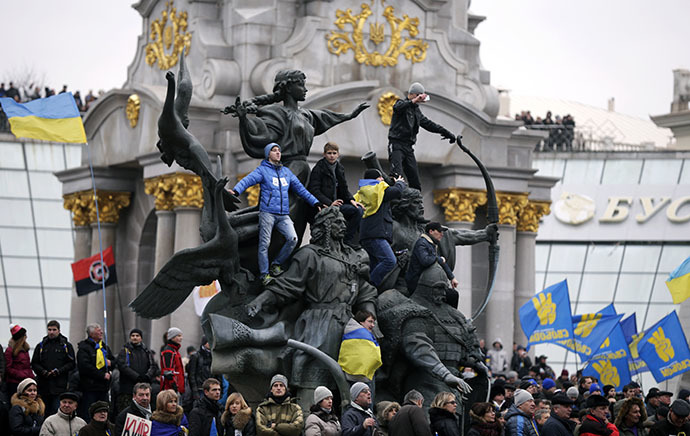
In the meantime in a specially issued statement, the Ukrainian president promised to do everything within his powers to speed up integration with the EU.
“We’re Europeans and our development is predestined historically,” Viktor Yanukovich said, stressing that Ukraine should be defending its national interests to remain “a big and truly independent” state on the political map of Europe, an equal partner of the European nations.
Last week the Ukrainian president shocked Brussels by refusing to sign an association agreement with the EU. Kiev postponed the move, citing the vulnerability of its economy, and triggering massive pro-EU protests in many Ukrainian cities.


